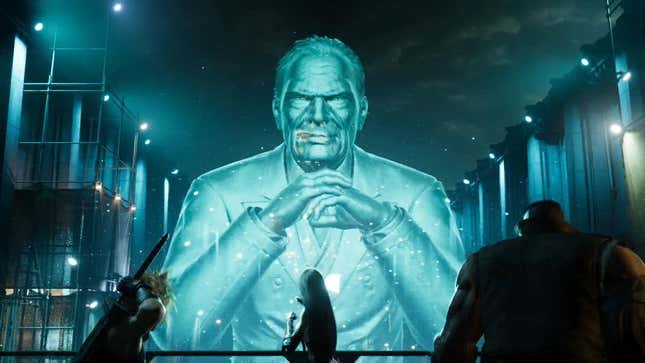
We aren’t even a week into 2022 and already another large video game publisher—this time it’s Square Enix—is praising the metaverse and blockchain gaming while planning to invest more resources into this terrible version of the future. And according to Square Enix president Yosuke Matsuda, the publisher could even issue their own NFTs (Non-Fungible Tokens) at some unspecified point in the future.
In a New Year’s open letter published on January 1, Matsuda presented hundreds of buzzwords and phrases in an attempt to convince people that Square Enix’s plans involving the metaverse, NFTs, and blockchain technology were totally not terrible. While the letter touches on a few different topics, including the metaverse and AI gaming, most of it is focused on Matsuda’s excitement surrounding NFTs and the future of crypto tech.
According to Matsuda, 2021 was just “NFTs: Year One” and he expects the technology to become “more commonplace among the general public” moving forward. It’s actually a bit hard to parse what Matsuda is trying to say as the letter reads more like someone copying and pasting buzzwords and ideas from other places into a Word doc while trying to reach a certain word count.
For example, here’s a bit from the letter talking about NFTs and how they will, apparently, help people create user-created content for some games.
“I realize that some people who “play to have fun” and who currently form the majority of players have voiced their reservations toward these new trends, and understandably so. However, I believe that there will be a certain number of people whose motivation is to “play to contribute,” by which I mean to help make the game more exciting. Traditional gaming has offered no explicit incentive to this latter group of people, who were motivated strictly by such inconsistent personal feelings as goodwill and volunteer spirit. This fact is not unrelated to the limitations of existing UGC (user-generated content). UGC has been brought into being solely because of individuals’ desire for self-expression and not because any explicit incentive existed to reward them for their creative efforts. I see this as one reason that there haven’t been as many major game-changing content that were user-generated as one would expect.”
My eyes glazed over as I tried to read that part of the letter, but not enough to miss the sentence that talks about how some people play games to have “fun” and how he almost sounds disappointed by that. Instead, Matsuda wants more players who “play to contribute” like mod makers, a thing that already exists, but now connected to a technology that also encourages art theft and contributes to increasing e-waste and global warming due to large-scale digital mining operations. It’s also a haven for scams, money-hungry celebs, and slimy grifters.
It should be noted that nowhere in this letter, which is still being mocked endlessly on social media by game devs and players, does Matsuda actually lay out any detailed plans or ideas for how Square Enix will implement blockchain technology in its games, what games NFTs could be integrated with or even any evidence for how this controversial tech will improve its video games. Instead, the letter reads more like what it really is: A way to convince investors and stockholders that Square Enix is totally into all this NFT and metaverse stuff.
None of this should be surprising. Square Enix already dipped its corporate toes into the NFT waters earlier this year and it was clear then that the company had bigger plans for blockchain gaming.
Square Enix’s president wants the company to join a growing list of game publishers and studios who are making, enacting, or apologizing for plans to bring NFTs into video games. Ubisoft angered a ton of people (including some of its own employees) last month after announcing plans to bring boring-looking NFT gear into a Ghost Recon game nobody plays anymore. (Spoiler: Nobody seems to be buying or selling any of that crap.) Other studios have announced NFT plans and canceled them or walked them back after backlash from players grew to be too much.